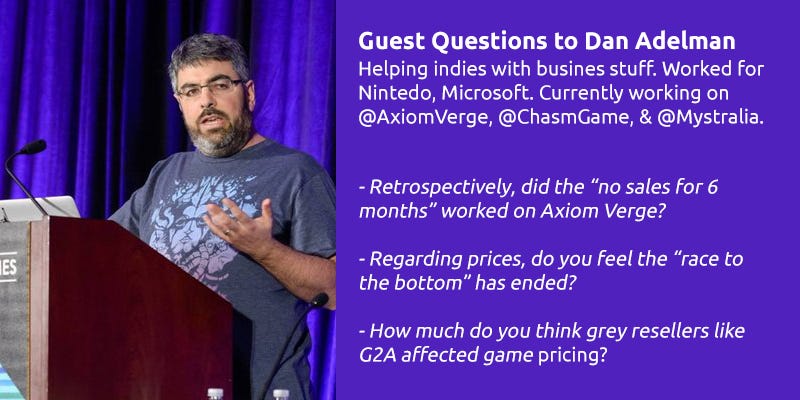Pricing your video game
Everyone has an opinion about the price of video games. Gamers often think games are too expensive. Game developers think it’s not expensive enough, except for their own game. Pricing is hard because it mostly sets things in stone. Once your game releases, there will be very few occasions to change its price, and every time you do it, it will have an impact. Let’s look at some psychological barriers.
COMPETITION — Is the field greener on the other side?
There are more and more games every year. Competition wasn’t a problem before, because there were very few games so every release was properly covered by the press and could guarantee you a specific amount of sales. Competition will become a growing problem for game developers.
You can’t set a price to a game and expect that nobody will look at other games of the same genre and their pricing. For people that are living on a budget, it’s a good factor to choose which game to buy.

gif by Thalia De Jong
F2P, for instance, are hardcore competitors for this. With the amount of great F2P games out there, it’s easy for a gamer to play games and never pay anything for it. I’ve been working on Battlerite, a multiplayer arena game in a $20 Early Access.
On the long term, it’s been hard to compete with some games such as League of Legends or Heroes of the Storm. With multiplayer, you have to play with your games. If your friends want to try the game, they have to pay it $20 and refund it later. Or they could just launch a F2P and not really care.
In the end, ask yourself those questions:
What are the prices of games similar to mine?
Should I be cheaper or more expensive than them? Why?
What is my unique selling point that my F2P competitor can’t match?
ANTICIPATION — What is the future made of?
Some game developers like to make their game more expensive at release, to anticipate for time-limited sales or bundles.
Sales are a must-do in our industry. At least that what you could think. Other game developers decided to use the Fuck Sales Method.
Axiom Verge’s creators said on launch that there’ll be no sales for at least 6 months after release. It’s a way for them to say players that if they’re waiting for sales, they’ll wait a long time. There is no real way to say if it’s a good attitude, at least for this game, it brought them a lot of money. The game has a very good long tail, and the no sales mean that they have a very good rate between copies and revenue.
There are very good articles around about pricing games, so you should read this one at least by Dan Adelman.

I’ve asked him a few questions
Tavrox: Retrospectively, did the “no sales for 6 months” worked on Axiom Verge?
Dan: I actually conducted a very non-scientific survey about this on our Steam forums. The short answer is that I don’t think the announcement actually changed many people’s behavior. Many people hadn’t heard the announcement, and among those that had heard about it, they either heard about it after buying the game or were planning on paying full price anyway. That said, the act of just not putting the game on sale for 6 months did have a positive effect on maintaining the game’s value. We launched in April or May, and some people were disappointed that we didn’t participate in the Steam summer sale. We finally put the game on sale for the first time over the holidays, so that initial modest price drop was in and of itself noteworthy. I still really like the idea of setting expectations for discounts. I think one reason that the announcement didn’t change people’s behavior much is that it’s not a standard part of the game release process. Normally developers talk about their release date, price, and platforms. If all developers made it a habit to include in their initial announcement some detail about how soon the first sale might be, consumers will know to look for that information.
T.: Regarding prices, do you feel the “race to the bottom” has ended?
D.: I’ve been encouraged to see lots of indie developers charging sustainable prices and resisting the urge to keep discounting. I think one reason for this might be because of the way Steam is conducting its holiday sales now. In the past, games would be on sale throughout the holiday period but on one day any individual game would have an even steeper discount. Valve highlighted those special deals and consumers would share information about the deals of the day. There were entire blog posts and discussion threads about the optimal strategy of when to buy what during a Steam sale. Steam’s new price protection policy doesn’t work with the one-day only special sale approach, so holiday sales have one price for the entire duration. The result is that there is less urgency to grab a hot deal while it’s active. Although that makes events like the holiday sales a little less impacting, I think it’s a healthier way for the industry to go. Thanks to the price protection policy, consumers don’t need to worry that they’ll regret buying a game because it became 50% cheaper the next day. If consumers are confident they’re not going to be made to feel like a sucker, they may not mind paying full price. I’d love to see if Valve has any data on this!



































